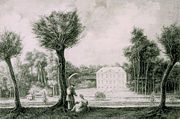
Château Malou
Encyclopedia
The Château Malou is a neoclassical
building in the municipality of Woluwe-Saint-Lambert
in Brussels
, Belgium
.
 The château
The château
was built in 1776 in the neoclassic
style by a wealthy merchant called Lambert de Lamberts. The current building replaced a small hunting lodge from the 17th century.
One of the owners of the château was the orangist
minister Pierre-Louis Van Gobbelschroy, until the end of the Dutch period in 1829. After Belgium gained its independence from The United Kingdom of Netherlands
, the château changed owners and eventually passed to the finance minister of the new Belgian government, Jules Malou
(1810–1886). Malou occupied the building from 1853 onwards and the building retains his name ever since.
The château now is the property of the municipality of Woluwe-Saint-Lambert and is primarily used for cultural activities, exhibitions, etc.
Neoclassical architecture
Neoclassical architecture was an architectural style produced by the neoclassical movement that began in the mid-18th century, manifested both in its details as a reaction against the Rococo style of naturalistic ornament, and in its architectural formulas as an outgrowth of some classicizing...
building in the municipality of Woluwe-Saint-Lambert
Woluwe-Saint-Lambert
Woluwe-Saint-Lambert or Sint-Lambrechts-Woluwe is one of the nineteen municipalities located in the Brussels-Capital Region of Belgium...
in Brussels
Brussels
Brussels , officially the Brussels Region or Brussels-Capital Region , is the capital of Belgium and the de facto capital of the European Union...
, Belgium
Belgium
Belgium , officially the Kingdom of Belgium, is a federal state in Western Europe. It is a founding member of the European Union and hosts the EU's headquarters, and those of several other major international organisations such as NATO.Belgium is also a member of, or affiliated to, many...
.
History

Château
A château is a manor house or residence of the lord of the manor or a country house of nobility or gentry, with or without fortifications, originally—and still most frequently—in French-speaking regions...
was built in 1776 in the neoclassic
Neoclassical architecture
Neoclassical architecture was an architectural style produced by the neoclassical movement that began in the mid-18th century, manifested both in its details as a reaction against the Rococo style of naturalistic ornament, and in its architectural formulas as an outgrowth of some classicizing...
style by a wealthy merchant called Lambert de Lamberts. The current building replaced a small hunting lodge from the 17th century.
One of the owners of the château was the orangist
Orangism (Belgium)
Orangism was a political current in what is now Belgium that supported its inclusion in the short-lived United Kingdom of the Netherlands . After the secession of Belgium in 1830, Orangist sentiment in Flanders for a time sought a restoration of the United Kingdom. Some of the most prominent...
minister Pierre-Louis Van Gobbelschroy, until the end of the Dutch period in 1829. After Belgium gained its independence from The United Kingdom of Netherlands
United Kingdom of the Netherlands
United Kingdom of the Netherlands is the unofficial name used to refer to Kingdom of the Netherlands during the period after it was first created from part of the First French Empire and before the new kingdom of Belgium split out in 1830...
, the château changed owners and eventually passed to the finance minister of the new Belgian government, Jules Malou
Jules Malou
Jules Edouard Xavier Malou was a Belgian statesman, a leader of the clerical party.He was born at Ypres. He was a civil servant in the department of justice when he was elected to the Chamber of Deputies by his native constituency in 1841, and was for some time governor of the province of Antwerp...
(1810–1886). Malou occupied the building from 1853 onwards and the building retains his name ever since.
The château now is the property of the municipality of Woluwe-Saint-Lambert and is primarily used for cultural activities, exhibitions, etc.

